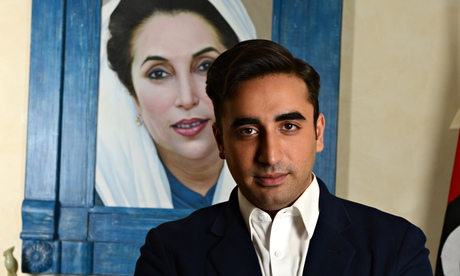Jon Boone
Bilawal Bhutto Zardari, 25, says prime minister and Imran Khan letting down nation by not backing firm military action
Bilawal Bhutto Zardari, the youthful heir apparent to one of south Asia's most famous dynasties, has launched a scathing attack on his political opponents who he said must stop "making excuses" for Taliban violence.
The 25-year-old son of the assassinated prime minister Benazir Bhutto said Nawaz Sharif, the country's current leader, and the opposition politician Imran Khan, were "letting down the people" by not backing firm military action against the Taliban.
"Perhaps they are suffering from Stockholm Syndrome," Bhutto Zardari said, referring to cases of hostages who sympathise with or even assist their captors. "There is no reason why the national leaders, the so-called leaders, should not speak out against people who are murdering our citizens, murdering our armed forces and claiming responsibility."
The remarks are likely to further burnish his reputation as both a brash new arrival on Pakistan's political scene but also the most outspoken politician in the country on the issue of militancy and extremism.
He does not sit in parliament, but wields significant influence over the Pakistan People's party (PPP), of which he is "patron in chief". The party has been led in the past by his grandfather, his mother – who was killed while campaigning in 2007 – and his father, Asif Ali Zardari. Khan and other right-wing politicians have been criticised for handling the Pakistani Taliban with kid gloves, in a so-far unsuccessful bid to lure them into peace talks.
On Saturday the Tehreek-e-Taliban Pakistan ( TTP ), as the country's deadly coalition of militants is known, signalled its appreciation of Khan's approach by announcing the movement wanted him to sit on a committee with four extremist clerics known to sympathise with militant aims. The TTP said Khan and the others could represent its interests in peace talks with the government.
Khan brushed off the embarrassing endorsement, saying "the TTP should select their own Taliban representatives for the peace talks".
Even mass-casualty suicide attacks on civilians have at times elicited only meek condemnations. Many politicians are reluctant even to identify the culprits as the TTP.
Bhutto Zardari said the tactic had been disastrous, emboldening extremists to target civilians, including Malala Yousafzai, the schoolgirl education activist who nearly died in 2012 after being shot in the head by a Taliban assassin. "This is why people like Malala become targets because the politicians, or the so-called leaders of this country, can't find the courage to speak out when a 16-year-old girl could. If we all speak in one voice, they can't kill us all," he said.
The TTP has used a highly effective intimidation campaign against liberal and left-leaning political parties and journalists to silence many of its natural critics. Bhutto Zardari said he could speak out only because of the vast security operation that surrounds him at all times and heavily restricts his travel in Pakistan, where he spends much of his time at his fortress-like family compound in Karachi.
"I have a lot of security – I lost my mother to the Taliban because of a lack of security – and that explains partly why I can be so vocal," he said. "But so does Imran Khan. Nawaz Sharif is the prime minister of Pakistan, Shahbaz Sharif is the chief minister of Punjab. They all have more security than I do. They have no excuse."
In the past Khan has said strident rhetoric might endanger the lives of his supporters and party activists. Bhutto Zardari has shown no such caution, even though he hopes thousands of members of the public will be attracted to numerous cultural events he has organised across Sindh in the coming weeks. They are part of a festival he has promoted as a deliberate challenge to extremists and militants he derisively calls "cavemen".
Bhutto Zardari is firmly against negotiations with the Taliban, saying the time has come for far-reaching military operations against the TTP, particularly in the militant stronghold of North Waziristan, an area bordering Afghanistan that for years has been a sanctuary for al-Qaida allied groups.
But he warned an operation should be in co-operation with Afghanistan, an unlikely proposition given the distrust between Kabul and Islamabad. "With Afghanistan there is no point of us launching an operation over here if they are just going to hop across the border and find sanctuary over there," he said. "The ideal situation would be an operation from both sides at the same time."
In recent weeks it had appeared that Sharif would finally announce the abandonment of a talks policy his close aides said had failed to make any progress. But instead on Wednesday Sharif announced he was giving them one last chance, announcing a hastily assembled commission of intermediaries to try to talk to the TTP.
Bhutto Zardari said he was exasperated by the decision: "It is extremely frustrating, not just for me but for the people who risk their lives on a daily basis, for the people who die on a daily basis," he said.


No comments:
Post a Comment